Play (2012)
by Robert Schenkkan
Directed by Bill Rauch
Set Design: Christopher Acebo; Costume Design: Deborah M. Dryden; Lighting Design: Jane Cox; Composer/Sound Designer: Paul James Prendergast; Projections: Shawn Sagady; Dramaturg: Tom Bryant; Dialect Coach: Rebecca Clark Carey; Casting: Telsey+Company; Associate Director: Emily Sophia Knapp; Production Stage Manager: Matthew Farrell
American Repertory Theater
Loeb Theater, Harvard Square, Cambridge, MA
September 13 – October 12, 2013
With Bryan Cranston (President Lyndon Baines Johnson), Betsy Aidem (Lady Bird Johnson, et al), Christopher Liam Moore (Walter Jenkins, et al), Susannah Schulman (Lurleen Wallace, Muriel Humphrey, et al), Reed Birney (Sen. Hubert Humphrey, et al), Dakin Matthews (Sen. Richard Russell, et al), Michael McKean (J. Edgar Hoover, et al), Arnie Burton (Robert McNamara, et al), Brandon J. Dirden (Rev. Martin Luther King Jr.), J. Bernard Calloway (Rev. Ralph Abernathy, et al), Ethan Phillips (Stanley Levison, et al), William Jackson Harper (Stokely Carmichael, et al), Richard Poe (Sen. Everett Dirksen, et al), Crystal A. Dickinson (Coretta Scott King, et al), Dan Butler (Gov. George Wallace, et al), Peter Jay Fernandez (Roy Wilkins, et al), Eric Lenox Abrams (Bob Moses, et al)
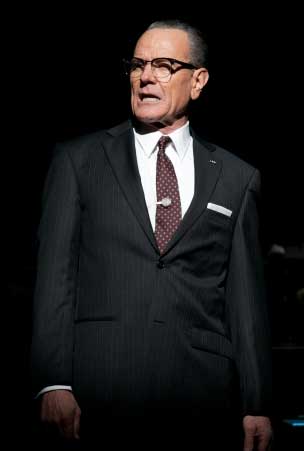
in “All the Way”
Photo: Courtesy of American Repertory Theater
The history is well known: John Kennedy was assassinated in November, 1963 and LBJ became president. In the year that followed, he saw through the monumental piece of legislation known as the Civil Rights Act of 1964 and successfully won a second term, beating out Barry Goldwater in the election later that year.
The amazing thing about this very long and heavily populated play is that it makes these well known historic events dramatic. It does so by moving the sense of the drama to a microscopic understanding of the political machinations involved and the force of LBJ’s personality in carrying them out.
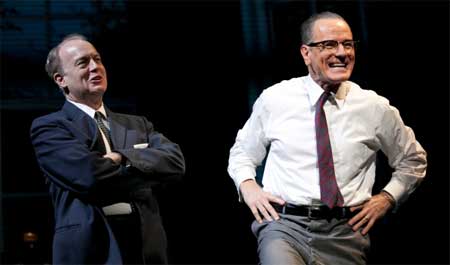
Bryan Cranston as LBJ
in “All the Way”
Cranston is unbelievably good in this role. He is a modestly sized man, unlike LBJ who was extremely tall (6’4″), but the force of his personality and the exactitude with which he conveys LBJ’s demeanor and disposition is really something. Whatever he does not have in height he makes up for in power and panache.
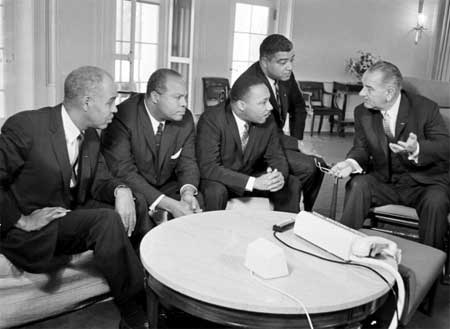
Roy Wilkins, James Farmer
Martin Luther King Jr., Whitney Young
meeting with President Lyndon Johnson in 1964
Photo: Associated Press
Courtesy of American Repertory Theater
What carries the play, and what lies at its heart, is the means by which it demonstrates the contrast between LBJ’s determination – both to see through the Civil Rights Act and to win the 1964 election – and his unsettlingly acute political skill. The writing evokes this balance so well that the drama lies not in the revelation of what happened but more in a revelation of how it happened. Like a great Greek tragedy, there is no secret in this play about what comes to pass. But, like one of those tragedies, it pulls us along by a sheer fascination with how it all will unwind into the end that we all know.
The play deftly stops at the end of the first term and succeeds in its dramatic purpose by leaving the subsequent eventualities – Johnson’s role in expanding the Vietnam War, and his decision not to run for re-election in 1968 – suggested but not delineated. That wise choice in the writing leaves a kind of tragic halo around the forceful and frequently histrionic aspect of LBJ’s character depicted here.
Cranston has a long background as a comic actor, having been first well known for his role in the TV series Malcolm In the Middle (2000-2006). Those talents serve him well in this role which frequently requires him to be broad and funny. He carries the house with the ferocity and intensity of his wit and wryness, but it is not done at the expense of the deeper aspects of character the play seeks to convey.
The production is staged inventively, though mostly set around what looks like a bunch of desks in a chamber of Congress. But beautiful projections on the back wall and some clever though minor manipulations of props give a varied enough sense to the action.
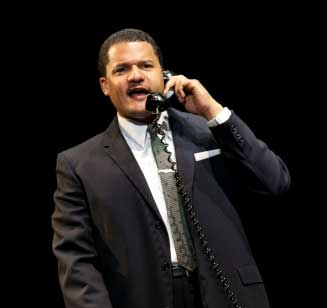
in “All the Way”
Photo: Courtesy of American Repertory Theater
The cast is very large – 17 – with almost everyone playing multiple roles. Many of the major players in the civil rights movement – Martin Luther King, Jr., Roy Wilkins, Ralph Abernathy, Stokely Carmichael – are included, as are many of the major political figures of the day. It helps to know the history before seeing the play, though seeing it is a spur to learn the history more accurately.

author of “All The Way”
Photo: Courtesy of American Repertory Theater
This is a long play – almost three and a half hours, with one intermission – but it keeps one’s attention. Despite the enormous number of characters and the considerable details of history traced, it does not feel overwhelming. The intensity and humor of Cranston’s performance glues the whole production together, with good support from the rest of the cast.
This well written play is artfully directed, effectively combining the remarkably entertaining dimensions of LBJ’s personality, the power of his social vision, his enormous political talents, and a detailed depiction of the political complexities of the day into a penetrating and lively theatrical experience.
– BADMan
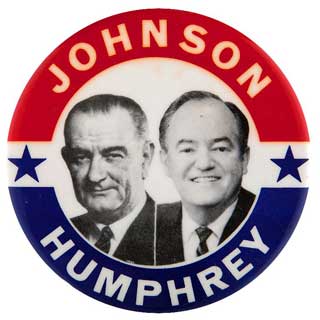
Thank you for this, Charlie. You bring the play alive and make me regret even more there are no seats available. I like how you make close distinctions between light and dark–you’re nuanced and ultimately credible and engaging.